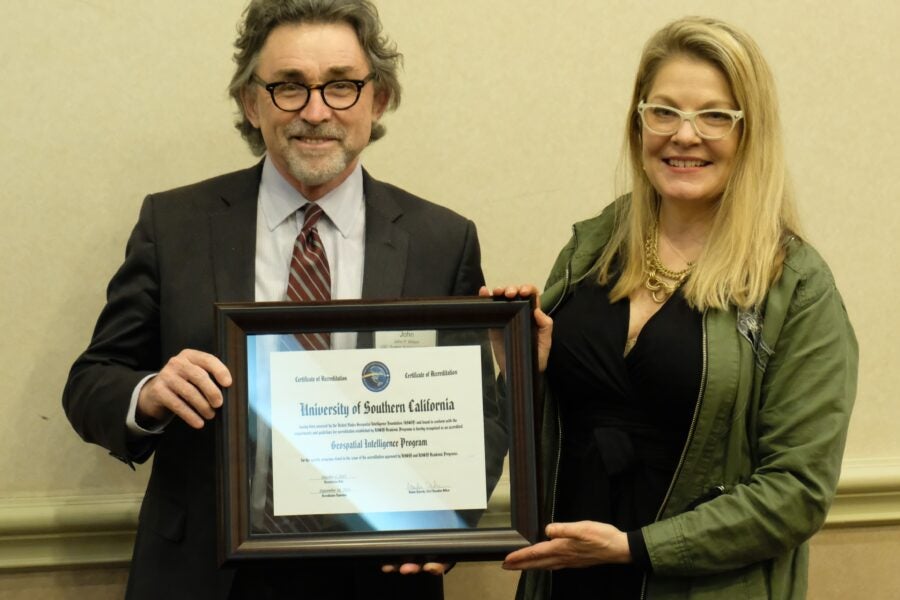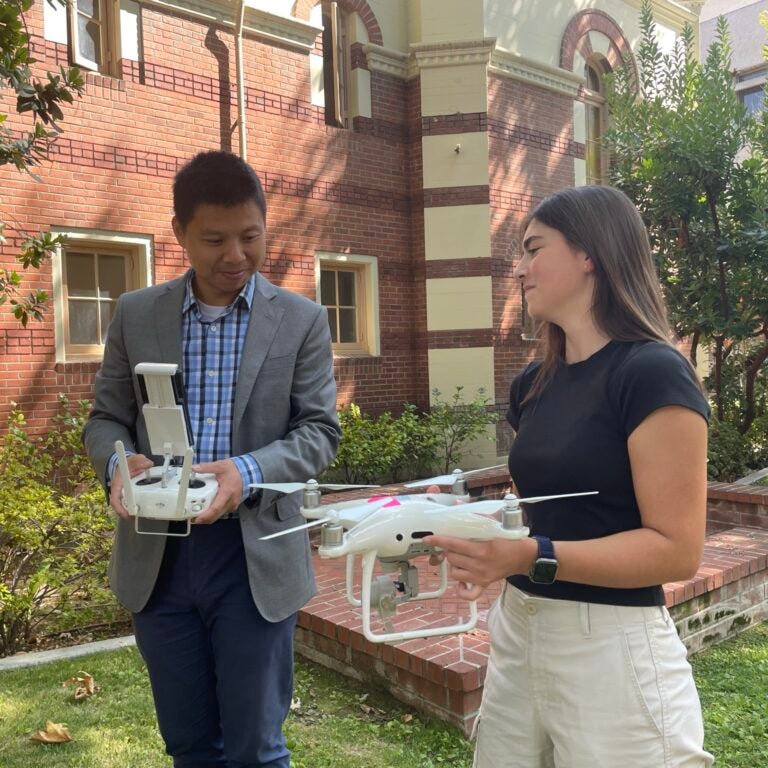Become a GEOINT leader
The residential M.S. in Human Security and Geospatial Intelligence (HSGI) empowers graduates to build leadership skills and pursue management roles within the geospatial intelligence (GEOINT) and human security fields. If you are someone who thrives in highly dynamic, often chaotic environments and has a passion for risk mitigation, disaster planning and threat response, this program could be for you.
The human security and geospatial intelligence industries have strong need for individuals who understand spatial science within the context of relevant political, social and environmental forces.
Master’s-level geospatial intelligence and human security professionals pursue senior-level and managerial careers in government, military and non-government humanitarian organizations. USC’s HSGI program prepares students to lead GEOINT initiatives and organizations operating at local, regional, national and international scale.
The residential (on-campus) program provides the same curriculum as the online program, which has graduated hundreds of successful GEOINT professionals. This program supports individuals of all background and skill sets, whether you are looking to break into the GIS profession, are interested in deepening your GIS expertise or are positioning yourself for advancement as a GIS or human security and geospatial intelligence professional.
Through robust coursework, the production of a capstone project, close contact with Spatial Sciences Institute faculty and connections with industry and alumni connections, our MS HSGI graduates typically find career opportunities even before they complete the program.

The United States Geospatial Intelligence Foundation (USGIF) has accredited all of SSI’s academic human security and geospatial intelligence programs. This accreditation indicates that our HSGI programs comply with the highest standards for GEOINT curriculum, faculty expertise, novel research approaches and availability of adequate resources for state-of-the-art teaching and learning.

“I am extremely grateful for all the opportunities I’ve had to learn and develop, all thanks to the resources at the Spatial Sciences Institute.”
Jong Su Kim, USC ROTC Air Force Cadet; B.A. International Relations ’19; M.S. Human Security and Geospatial Intelligence ’20, Information Integration Officer, Second Lieutenant, U.S. Air Force

Applications for Summer 2024:
Opens on Monday, January 1, 2024
The deadline to apply is Friday, February 16, 2024
Applications for Fall 2024:
Opens on Monday, January 1, 2024.
The deadline to apply is Friday, June 7, 2024.
Applications are accepted for admissions in the fall, spring and summer semesters on a rolling basis.

Curriculum Summary
The M.S. in HSGI program consists of 34 units, providing knowledge of GIS techniques and data within the context of incident preparation and response. The core courses provide deep understanding of human security issues and how they relate to man-made as well as natural disasters. You will also learn the critical role that geospatial intelligence plays in military, disaster management and humanitarian operations.
As part of the curriculum, you will experience a weeklong fieldwork excursion to the USC Wrigley Institute for Environmental Studies, a half-acre research and educational campus on Catalina Island.
Through the capstone course and two focused practicums, you will also gain orientation to the HSGI industry community to jumpstart your career or to strategize for moving your GEOINT career forward.
The USC M.S. in Human Security and Geospatial Intelligence has the U.S. Department of Education CIP code of 45.0702 for Geography and Cartography, identified as a STEM CIP code.
FAQs
-
Although many students have a GIS background before entering the program, we encourage anyone with an interest in the spatial sciences to apply. Our graduate programs are designed to be applicable across disciplines and include options for experienced GIS professionals as well as individuals with little or no experience in the geographic sciences. We will consider all elements of your professional and academic background when reviewing your application.
-
Start your application here and submit a $90 application fee.
-
You’ll submit a Statement of Purpose as part of your online application.
In this statement, please:
- Describe your motivation, field of interest and career goals.
- Identify potential projects that you might pursue for the master’s thesis project.
If you have questions about potential thesis topics, don’t hesitate to contact an enrollment advisor.
-
Your resume can be in any format; one page is preferable.
-
Please be prepared to submit two letters of recommendation from individuals who can speak specifically to your ability to be successful in a masters program.
The letters should be on letterhead and personally signed by the letter writer.
The letter writer should be someone who knows you in a professional or academic setting. They should not be a relative or friend/social acquaintance.
-
Please submit a writing sample with your online application.
The writing sample can be any kind of written product which you consider to be the best representation of your professional communication skills. It may be a piece written in undergraduate or graduate studies, or in the workplace. It should be a well-written piece that fully demonstrates your ability to present material in a logical, cohesive and organized manner.
-
Yes, your bachelor’s degree must be from a regionally accredited institution.
-
Yes, your cumulative undergraduate GPA should be a 3.0 or higher.
-
We require official transcripts from all of the academic institutions you attended, sealed by the institution.
For more information regarding transcripts, visit https://gradadm.usc.edu/lightboxes/us-students-transcript-requirements/
-
In addition to the general admission criteria, international applicants whose first language is not English are required to take the TOEFL or IELTS examination to be considered a candidate for admission.
Please see https://gradadm.usc.edu/lightboxes/international-students-english-proficiency/ for more information about the requirements.
-
The University of California and the Dornsife Spatial Sciences Institute are proud to offer a variety of funding options for active duty personnel and veterans.
Please visit https://military.usc.edu/students/current-students/graduate-financial-aid-and-va-benefits/ and email the USC Veterans Certification Office at vets@usc.edu with your unique questions about your GI Bill or other benefits.
Learning objectives
Graduates of the program will be able to:
- Lead and manage new initiatives within the rapidly evolving GEOINT landscape
- Apply innovation to influence the successful generation, adoption and deployment of new ideas
- Evaluate and solve for how disruptive technologies might affect GIS organizations in the future
- Design and implement strategies for sourcing and managing spatial data for use in geospatial initiatives and applications
- Leverage GIS and related software to develop innovative insights using spatial data
- Master the theory and protocols of radar interpretation, infrared and multispectral imagery, full motion video, legacy maps, digital geospatial datasets and social media feeds
- Shape the results of geospatial information management groups and organizations.

Sample Course Plan (subject to course scheduling)
For information about a sample course plan, please talk with an enrollment advisor.
Semester 1
-
The unique characteristics and importance of spatial information as they relate to the evolving science, technology and applications of Geographic Information Systems.
-
This course examines the role of global positioning systems, maps, geocoding and other kinds of sensors as geospatial data sources. Students will also participate in a field data acquisition excursion on Catalina Island, in which they will have opportunities to meet their peers as well as network with leading GIS scientists and other experts.
Recommended preparation: SSCI 581
Semester 2
-
The relationship between human security (population growth, urbanization, conflict) and disasters, both man-made and natural, where complex emergencies are impactful to human populations.
-
This course closely examines the way GIS provides value within an organizational context. Students will also learn the qualities and skills leaders need to help their teams form new ideas and how to drive their organizations toward success.
Recommended preparation: SSCI 581
Semester 3
-
This course explores the practical application of geospatial intelligence, highlighting specific examples of its use in military operations, national security, international relief work and disaster management. Students will gain a comprehensive understanding of the many and varied types of threats that impact human security and how geospatial technologies and methodologies can be used in each type of scenario.
Recommended preparation: SSCI 581
-
This course examines the concepts, principles and use of project management tools, with a focus on the common people-centric issues encountered running GIS projects. Topics covered include the geospatial project lifecycle, budgets, risk management, team building and ongoing trends that may influence geospatial project management (e.g. increasing usage of open source software).
Recommended preparation: SSCI 581
Semester 4
-
This course examines the principles and technology of remote sensing and role of remote sensing data in GIS applications. Students will learn to implement and evaluate digital image processing methodologies. This course also explores common uses of remote sensing data in human security and environmental sciences.
Recommended preparation: SSCI 581
-
-
This course explores how remote sensing systems provide geospatial information that is relevant, accurate, timely, accessible, cost-effective and available in an appropriate format. Students learn the principles of remote sensing and the technical characteristics and constraints of Earth observation missions. They generate geographical information by processing digital remotely sensed data and critically evaluate its use for human security and environmental applications.
-
This course provides the knowledge and skills for developing customized GIS applications. Students will gain hands-on experience designing, coding and implementing GIS-based software. The course focuses on leveraging programming languages commonly used in GIS software, including Python.
Recommended preparation: SSCI 582
-
Cartography and Visualization: Principles of visual perception, spatial cognition and cartographic design and their contributions to the maps, animations, virtual reality and multimedia displays produced with modern GIS.
Semester 5
-
This course provides a hands-on opportunity in which students apply the knowledge and GEOINT skills to make an informed human security recommendation. In the capstone course, students will work with one of USC’s GEOINT partners to solve a real-world GEOINT challenge.
Pre-requisites:
SSCI 577; SSCI 588; SSCI 579; SSCI 581;
SSCI 585 (can also be taken as a co-requisite)
Talk with an enrollment advisor
To learn more if the USC M.S. in Human Security and Geospatial Intelligence program is right for you, please email spatialsciences@usc.edu.





